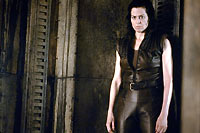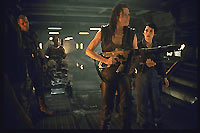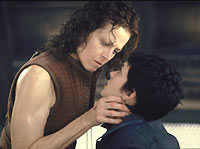ALIEN:
RESURRECTION
NB:
This review originally appeared in Shivers magazine, issue 48.
Click
on the cover image - left - to order a copy from the publisher
Director: Jean-Pierre
Jeunet
Stars: Sigourney
Weaver, Winona Ryder, Dominique Pinon, Ron Perlman
UK Release: 28th
November 1997
Certificate: 18
[NB: subsequently re-certificated 15 for video]
Running Time: 109m
approx.
When
20th Century Fox titled the latest movie in their Alien
franchise Alien: Resurrection they must have been acutely aware that they
needed a miracle of almost Biblical proportions to revive the series after
the critical and relative box-office failure of Alien³. Their initial problem was that in 1992 they had rather
foolishly decided that David Fincher’s movie would be the final film in
a trilogy. They had rather prematurely killed off their principal
character in much the same way that Doctor Arthur Conan Doyle sent
Sherlock Holmes tumbling to a watery grave in The
Final Solution.
 There
can’t have been much doubt that if the studio were to make a fourth film
they would want to bring back their leading lady, (apart from the alien
creature the only touchstone to feature in all the movies). In science
fiction it’s easy to bring back characters from the dead. It’s so
common that any explanation is almost superfluous, and if it can be
quickly and reasonably covered in a couple of lines of dialogue, so much
the better. Here, a couple of hundred years after her death, Ripley is
revived as a clone taken from tissue rescued from the furnace on Fury 161.
In cloning Ripley the scientists on the huge research spaceship, the USS
Auriga, have also somehow created a duplicate of the alien queen that was
growing inside her and extract it. They use the queen as an incubator to
create a dozen alien warriors, which they hope to harness for some
unspecified, but no-doubt nefarious, purpose. There
can’t have been much doubt that if the studio were to make a fourth film
they would want to bring back their leading lady, (apart from the alien
creature the only touchstone to feature in all the movies). In science
fiction it’s easy to bring back characters from the dead. It’s so
common that any explanation is almost superfluous, and if it can be
quickly and reasonably covered in a couple of lines of dialogue, so much
the better. Here, a couple of hundred years after her death, Ripley is
revived as a clone taken from tissue rescued from the furnace on Fury 161.
In cloning Ripley the scientists on the huge research spaceship, the USS
Auriga, have also somehow created a duplicate of the alien queen that was
growing inside her and extract it. They use the queen as an incubator to
create a dozen alien warriors, which they hope to harness for some
unspecified, but no-doubt nefarious, purpose.
The
Ripley clone, number eight in a limited edition, is taught some basic
lessons to fill in the blanks in her less-than-perfect memory. Here again
the film stumbles, allowing her some convenient recollection of her
earlier incarnation, rather than beginning with a clean slate.
A
ramshackle supply ship, the Betty, docks, and the crew off-load its cargo
of cryogenically-suspended bodies. The Auriga scientists, led by Gediman,
(obviously a few buns short of a picnic, and played with characteristic
intensity by Brad Dourif), will use the bodies as hosts for the queen’s
eggs.
 The
Betty’s shady crew of smugglers and mercenaries are the film’s most
important characters. They are led by Elgyn (The
Crow’s Michael Wincott), a man who prefers to deal in cash, and who
isn’t too concerned what the Auriga’s commander, General Perez (Dan
Hedaya), wants his unusual cargo for. The muscle is provided by Johner (Perlman),
a no-nonsense, distinctly non-PC, hard-drinking mechanic. He also supplies
moments of light relief, and has a nice uneasy rapport with Ripley. The
wheelchair bound Vriess (Pinon) is fiercely independent, but has to rely
on his colleagues when the aliens cut of their escape route back to the
Betty. The “severely fuckable” Call (Ryder), a recent addition to the
crew, has a few secrets and an agenda of her own. They are later joined by
Purvis (Leland Orser), one of the sleepers that Elgyn delivered. He’s
terrified, even more so when he discovers that he has been implanted with
an alien embryo. The other Betty crew-members make little impression, and
largely serve to provide in-flight snacks for the alien warriors. The
Betty’s shady crew of smugglers and mercenaries are the film’s most
important characters. They are led by Elgyn (The
Crow’s Michael Wincott), a man who prefers to deal in cash, and who
isn’t too concerned what the Auriga’s commander, General Perez (Dan
Hedaya), wants his unusual cargo for. The muscle is provided by Johner (Perlman),
a no-nonsense, distinctly non-PC, hard-drinking mechanic. He also supplies
moments of light relief, and has a nice uneasy rapport with Ripley. The
wheelchair bound Vriess (Pinon) is fiercely independent, but has to rely
on his colleagues when the aliens cut of their escape route back to the
Betty. The “severely fuckable” Call (Ryder), a recent addition to the
crew, has a few secrets and an agenda of her own. They are later joined by
Purvis (Leland Orser), one of the sleepers that Elgyn delivered. He’s
terrified, even more so when he discovers that he has been implanted with
an alien embryo. The other Betty crew-members make little impression, and
largely serve to provide in-flight snacks for the alien warriors.
Ripley
is Alien: Resurrection’s wild
card, and the re-invention of her character is one of the film’s most
interesting elements. Now genetically tied to the alien gestalt, the
Betty’s crew can never be sure where Ripley’s allegiances lie, and
neither is she. The old Ripley’s actions were always predictable, and
always worked towards eradicating the alien threat. Weaver plays Ripley 8
with palpable glee, obviously relishing the chance to explore new nuances
of a character she’s now been playing on and off for almost twenty
years.
Alien:
Resurrection is directed by Jean-Pierre Jeunet, who co-directed two
superb fantasy movies, Delicatessen and La Cité Des
Enfants Perdus (The City of
Lost Children), both wonderfully inventive movies with a peculiar
Gallic feel. There’s little evidence of this pedigree in Alien: Resurrection, (some echoes in the costume design, and parts of
the Auriga looks similar to the laboratory in City), but the new film never astonishes, and it’s hard to see why
the studio selected Jeunet, if not for his idiosyncratic style.
 One
of the best things about sequels is that each new film can advance the
mythology. Aliens added
information about the creature’s reproductive cycle, and introduced the
alien queen. Alien: Resurrection repeats
one of the fundamental problems of Alien³,
adding virtually nothing of value to our understanding of the
creatures. Although some effort is made to invest the aliens with a degree
of cunning and intelligence they are generally portrayed as little more
than animals. There are only hints of the power and majesty that James
Cameron was careful to nurture in Aliens.
Neither does the new film make them as terrifying as Ridley Scott did in
the original. Only one shot, (of a creature slithering into an escape
pod), is at all chilling. One
of the best things about sequels is that each new film can advance the
mythology. Aliens added
information about the creature’s reproductive cycle, and introduced the
alien queen. Alien: Resurrection repeats
one of the fundamental problems of Alien³,
adding virtually nothing of value to our understanding of the
creatures. Although some effort is made to invest the aliens with a degree
of cunning and intelligence they are generally portrayed as little more
than animals. There are only hints of the power and majesty that James
Cameron was careful to nurture in Aliens.
Neither does the new film make them as terrifying as Ridley Scott did in
the original. Only one shot, (of a creature slithering into an escape
pod), is at all chilling.
A
cursory analysis of Alien:
Resurrection reveals that the film is a patchwork of elements recycled
from the earlier films. Nowhere is this more apparent than in John
Frizzell’s disappointing score, which borrows liberally from Jerry
Goldsmith’s music for the original movie, and also quotes from James
Horner’s Aliens.
The
plot is rather thin and poorly developed. The film spends a lot of time
building an interesting framework, but simply disintegrates when the
aliens attack. From that point on it’s a rather dull linear plot that
merely moves Ripley and the Betty crew through the ship towards their
destination, and safety. It becomes a fairground ghost train ride, and is
about as exciting.
It’s
clear that 20th Century Fox wanted to play safe with the new
film, relying on tested formulas and conventional techniques. It’s
resulted in a truly unremarkable sequel. Alien:
Resurrection is a film with a broader appeal than Fincher’s
underrated movie, and should resuscitate the series’ flagging fortunes,
but it’s unlikely to be lauded by the series’ most stalwart fans.
|